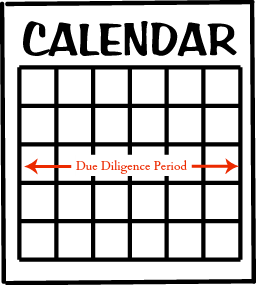Several weeks ago, I listed some tips of what to do BEFORE you start to buy a home. (Read the article here). I’d like to continue with this discussion by covering what you, as a buyer, should expect once you’re under contract. If you are a first-time homebuyer, you may never have been informed on exactly what just happens between the time you’ve signed a purchase and sales contract to the time you actually get the keys handed over to your first home. Let me list the major items, so you’ll know exactly what to expect.
Before I mention the main steps involved, I want to quickly go over 3 important timelines in a contract. These are important because they protect you, as the buyer, from losing your earnest money (more explanation on earnest money in a moment).
3 Important Timelines:
 1) Due-Diligence Period: This allows you to be fully informed of the state of the home and discover any repairs needed to the home via a home inspection. You can negotiate with the seller during this time on any repairs needed. The due-diligence time period is negotiated in the contract and can range anywhere from 5-12 days. In Georgia, you can back out of the contract during this time for ANY reason whatsoever and get your full earnest money deposit back. After the due-diligence period expires, you could still walk away from buying the home, but you would forfeit your earnest money.
1) Due-Diligence Period: This allows you to be fully informed of the state of the home and discover any repairs needed to the home via a home inspection. You can negotiate with the seller during this time on any repairs needed. The due-diligence time period is negotiated in the contract and can range anywhere from 5-12 days. In Georgia, you can back out of the contract during this time for ANY reason whatsoever and get your full earnest money deposit back. After the due-diligence period expires, you could still walk away from buying the home, but you would forfeit your earnest money.
2) Appraisal Contingency Period: This is another negotiated time range, typically around 20 days from a binding contract (but can be more or less). Your lender will order an appraisal by a 3rd party appraisal company to go out and review the home and determine its market value. A lender will only loan an amount of money equal to the appraised value.
If the appraisal would come back for a value lower than the agreed sales price, there are usually 3 outcomes:
- The seller will reduce the sales price to the appraised value (or an agreed upon value by you and the seller).
- If the seller will not reduce the sales price, you can continue to buy the home, but will have to make up the difference in cash. (In other words: Sales Price – Appraised Value =Additional cash down payment needed from buyer)
- If the seller will not reduce the sales price, you can decide to not buy the home and will receive your earnest money back.
3) Financing Contingency Period: Again, this is a time period negotiated in the contract (typically around 21 days). This protects you in the case that your lender determines after reviewing all your financial documents that your loan cannot be approved. The lender will send a notification to the seller for proof that you were not approved for the loan. This allows you to receive your earnest money back.
Now that we have the contingency timelines  outlined, lets look at what will happen once you are under contract. I’ll assume you’ve found a home, negotiated a purchase price and have agreed to terms with the seller and have both signed the purchase and sale contract. Hooray! You are now under contract!! So what’s next?
outlined, lets look at what will happen once you are under contract. I’ll assume you’ve found a home, negotiated a purchase price and have agreed to terms with the seller and have both signed the purchase and sale contract. Hooray! You are now under contract!! So what’s next?
1) Earnest Money is Given to Seller
Typically in a contract, the buyer will promise to send an amount of money, called earnest money, to the seller once under contract. Earnest money is a way of showing the seller that you, as a buyer, are serious about your offer. It’s actually not required in a contract, but it is customary and expected. Here in Georgia, earnest money is usually equal to 1% of the sales price (but this amount can be higher in certain situations). The earnest money is held in a trust account, usually at the closing attorney’s office, and will remain there until the day of closing. The earnest money will be applied to the down payment.
The benefit of the seller of receiving earnest money is in cases where a buyer would back out of a contract for a reason that is outside of the contingency periods. This is a way to compensate the seller for the loss of valuable time and money due to a buyer’s default on a contract.
2) Get a Home Inspection
During the due-diligence period, you should order a home-inspection by a qualified home inspection company. (I have great ones I can recommend). It can cost anywhere from $350-$550+ depending on the size of the home. This is something you don’t want to skimp on to save a few bucks. In fact, your home inspector may discover major repairs that can save you hundreds, thousands, or even prevent you from buying into a complete money pit! How often do you buy a car without giving it a test drive? Same thing goes for a house. You want to be informed of what you are buying and understand where things are such as the HVAC, main water shut-off valve, gas lines, etc.
3) Send your lender paperwork – And lots of it!
Once you are under contract, your real estate agent (hopefully that is me!) will quickly and constantly be in touch with the closing attorney and your lender to provide them all the information about the contract details. Your lender will start to process your loan and will be asking you for lots of financial paperwork. Be prepared to spend time digging out your W2’s, paycheck stubs, financial statements, etc. It can be overwhelming to constantly be searching for documents, but stick with it! Lenders are working hard to get your loan approved as quickly as possible to meet your financing contingency deadline, but they need your prompt replies on information to get the job done.
4) Take a deep breath and relax.
Once you’ve sent all your paperwork to your lender, just remember, you have just finished one of the hardest parts of closing on a house!
5) Complete Appraisal and Financing Contingencies
There is nothing you have to do for an appraisal. The appraiser will go out and appraise the home and send a report to the lender who will forward the report to you. We’ll assume in this example that the home appraised of value and you also heard from your lender that your loan has been approved. You have passed all the contingencies and now are ready to get to the closing.
6) Final Walk-Through
Generally a day or even an hour before closing, you can go back through the home one last time to check out that the home is still in the condition you expected it to be in prior to buying the home. For example, you want to make sure a tree didn’t fall on the roof, huge holes were punched into the walls, or the wooden floors got all scratched up. This is rare, but you never know!
7) Receive a Closing Settlement Statement
Usually, you should receive a closing settlement statement from the closing attorney 3 days prior to closing. This is a standard form which is used to itemize the services and fees charged to the borrower by the lender when applying for a loan. It will also inform you how much money you will need to bring to closing. You will wire these funds to the closing attorney’s account (wiring instructions are given to you in advance).
8) Close on your home and get your keys!
You and the seller will go to the closing attorney’s office to sign all the paperwork to officially claim the title to your new home and collect your keys. You will need to bring your driver’s license and a checkbook (in case you need to settle any small differences between the wired funds and actual final settlement amount).
So there you have it. This outline is a general summary of what happens once you are under contract. It may seem a bit overwhelming, but that is what I am here for. I’ll keep track of these deadlines, be in constant communication with the seller’s agent, attorneys, lenders, inspectors, etc. and advise you on how to resolve any special circumstances that should arise. As always, if you have questions, feel free to contact me!



